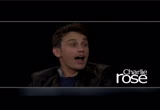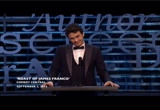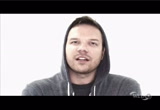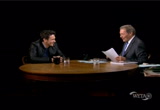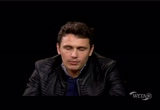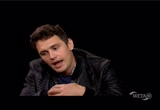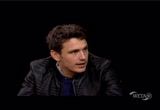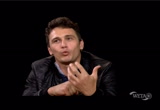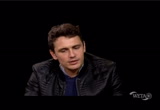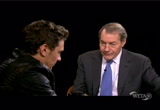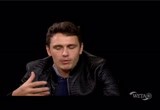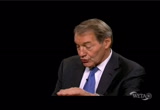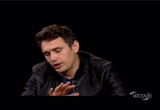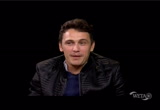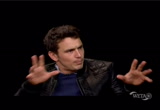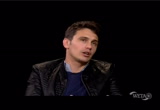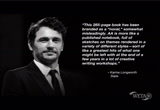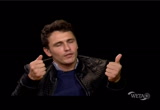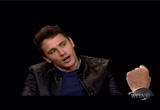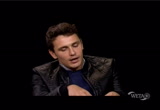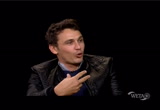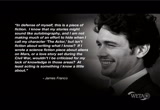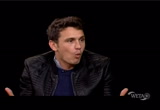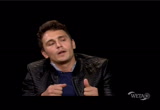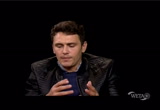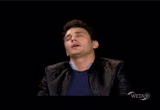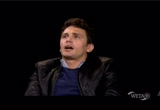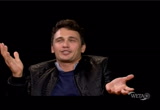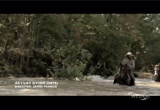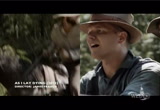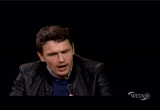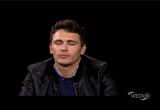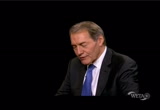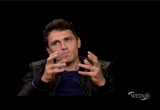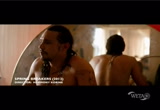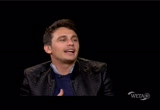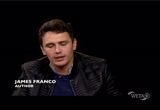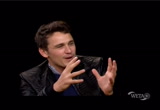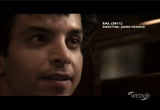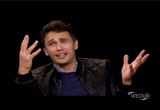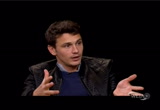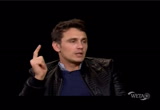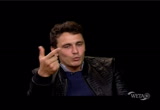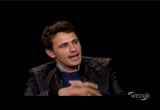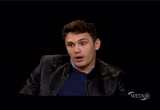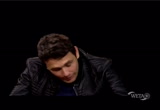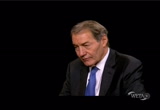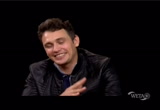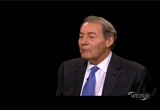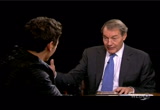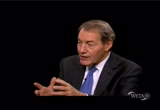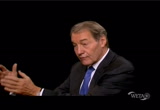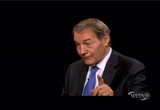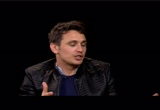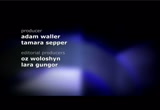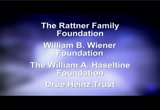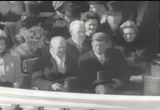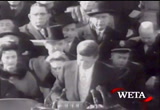tv Charlie Rose PBS November 8, 2013 12:00pm-1:00pm EST
12:00 pm
>> rose: welcome to the program. tonight, a conversation with a man of many talents, james franco. >> i can't work any harder than i've been working. and i -- and i -- 1% of me does it to just be able to say to people "look, i'm not a fake. back off." the other 99% of me went to school and studied all those things because i want to take writing and directing and everything as seriously as i take acting. so i've heard that you've had interviews with a lot of people. so have you ever been asked to -- >> rose: no. >> kill anybody? >> rose: not only that, i've had
12:01 pm
12:02 pm
captioning sponsored by rose communications from our studios in new york city, this is charlie rose. >> this is not a roast! this is my greatest, most elaborate art installation ever. (laughter) (cheers and applause) i'm not the real guest of honor, these aren't real comedians and we're not even on a real network. (laughter) what you've seen tonight was my brilliant opus to sequester and artistic visionary and subject them to the mindless incoherent trashings of a scattering of
12:03 pm
miscreated talentless abnormalities. i call it "genius unscathed." and this is my masterpiece! (cheers and applause) >> rose: james franco is here. he is an actor, a director, an artist. he's also an author. the los angeles angels of anaheim described him as -- the "los angeles times" described him as the prince of perpetual motion. his new book is called "actor anonymous" and here is the trailer for the book. >> i am the actor. >> i am the actor. >> i am the actor. >> i am the actor. >> i'm an actor so i can play anything. everyone is in me and i am in everyone. i'm part of your consciousness. >> you don't think so? you want to deny i've made my way inside? >> look, i'm here to entertain you, but i don't really care about anything, you know what i mean? >> i used to care a lot about acting. but now i see that you're only as good as your material. >> and if your material is good, you're only as good as your
12:04 pm
director. >> there's so much dependence on others that i can't care about acting anymore. >> i'm jack nicholson and marlon gran bran doe, jimmy stewart, steve mcqueen. >> i'm nicholas cage and robert pattinson, james dean and rock hudson. >> i am norma shearer and lillian gish. >> i'm garbo. >> i'm like a sophisticated prop. i give you all the feeling you want, all the hair styles and wardrobe changes you want. i'm say whatever you put in front of me. >> do not expect me to take pride in what i do. >> i used to care about how i looked. now i don't care as much. maybe it's because i'm so handsome. >> rose: i am pleased to have james franco back at this table. welcome. >> thank you. >> last time we saw each other was at brown university where you were attending rhode island school of design? >> that's great. that was a great interview. thank you. >> rose: so i just touch on this
12:05 pm
because you must get tired of talking about it. why so many things? or why not so many things? >> right. good question. um -- i admit i do a lot of things but they're all things i've been interested in as long as i've been interested in acting. basically they all -- you know, i guess -- they all fall under film, art, and literature. those are my things. they just have different forms and what i've found is that i can combine them. i can bring them together so the book is a great example where it's a book, it's a novel. at its center is acting. so i suppose why so many, the point isn't -- some people think it's an attention-getting thing or that -- >> rose: creating a brand. >> creating a brand. or trying to tackle as many things as possible and it's really not that as i think as
12:06 pm
much as being able to find the best form for the different subjects that i'm interested in. and in something like contemporary art -- i was at r.i.s.d. studying art. in that world it's fairly common and accepted for an artist to be a painter, make videos, maybe write a book. and that's because the art world has just moved beyond. they've moved beyond form, they've moved beyond the studio. it's a post-studio world and it's been that way for decades. but when an actor does it there's skepticism. rightly so. because actors generally speak or at least when you do a certain level of movie-- have a certain level of celebrity and so people are skeptical of act
12:07 pm
using their celebrity to, you know, gain in roads to areas that they otherwise wouldn't have access to. so i understand all of that. but i also have done as much work and gone to as much school as, you know, anyone else. so there's nothing i can -- i can't work any harder than i've been working. 1% of it does it to say to people "look, i'm not a fake, back off." the other 99% of me went to school and studied those things because i want to take writing and directing and everything as seriously as i take acting. >> rose: do you get a pass because you're james franco, meaning that they give you a break? you don't have to be as good as
12:08 pm
people who have devoted their life to it? >> i think it goes both ways. i think -- and then there are some forums that are more accepted paths for an actor to taken that others so now it's generally more -- you know, people are okay with the actors becoming directors ben affleck won an oscar for best picture and eastwood and kevin costner, it's -- it's -- redford. i mean, anyone, almost anyone from the '70s that was an actor, nicholson, de niro, beatty, they've all directed and most of them directed some very good movies. when an actor writes a book-- not a memoir but a book of fiction, i would say the fives are out. before i have anyone -- before anyone has read it the guns are already out.
12:09 pm
so i wrote a book of short stories called palo alto. >> rose: about where you grew up? >> it takes place in my hometown palo alto, california, about the time i was a teenager and it's about teenagers but it's a book of fiction, again. it's not a memoir. it was fairly well accepted. i got decent reviews but there was still -- what i was doing at the time when that first book came out about three or four years ago was trying -- i thought i need to keep my two worlds separate. i'm not going to write about acting and and i want people to view me as a writer. then i thought i have all this experience in the film world, almost 20 years of professional work.
12:10 pm
other writers use what they know journalists who travel the world and have some crazy experience will write a book about that. they won't say "i'm going to write a book about that." >> rose: david ignatius is a perfect example. he writes about foreign affairs in the "washington post." he's also a very good novelist and writes books made into movie and there you go. >> and i'm sure they're about foreign affairs. >> rose: right. he writes about what he knows, spice and iran and all of that. >> john grisham is going to write about lawyers. >> rose: exactly right. so you're going to write about what you know. do you fear failure or not? in other words, risk taking is part of who is in -- it's part of you. it's in your d.n.a. >> i need to do that. i realized fear of embarrassment
12:11 pm
can be extremely stifling and if i think back to when i was a teenager i loved movies and i loved plays. i would gol to san francisco and see plays butpy never engageed with acting. i never really tried it and i think that was just fear of embarrassment and then on the stage a fear of public embarrassment. and once i became an actor you get over shyness and everything because you have to talk to a lot of people, this kind of thing. but then the second step was, all right, if i'm going to i was writing and doing art long before i started doing it publicly. but i knew if i'm going put this book out or if i'm going do whatever.
12:12 pm
i'm going to have to face potential criticism or skepticism or whatever. so if this is what i want to do this is the price i have to pay and it kind of got me over that so now if the only thing that's holding me sbak the potential for failure and embarrassment i do it i never want that to hold me back. >> rose: it's one thing to write a book. but it's quite another thing to go to yale and say "i want to be in your graduate program because their standards are different. it's not just write a novel and see if anybody buys it. here's a case where you have to meet high standards. you have to get admitted and then you have to stay up with i assume a certain program otherwise their reputation is damaged. >> i'm sure some people still argue that oh, do we wñt james
12:13 pm
franco associated with yale? and et cetera. but i could buy that maybe if it was the undergraduate program. ph.d. programs are different. they're paying me to go to school. so that's a big commitment from them. and it is a lot of work. so, you know -- for know kind of keep up with. so that was also something i had to be very clear with myself that i wanted to do it. fortunately i'm past the course work phase. there's two years of courses. >> rose: now you're writing a december pen sags or -- >> before i do that i have to take my oral exams. so in the english department you have to read 30 books in five subjects. so that's 150 books and then five professors will sit around and ask me questions about those 150 books.
12:14 pm
so i'm in the middle of that. i read almost a book a day and so i have my exam in january. >> rose: how do you have time for acting and directing? >> well, there are -- there is a lot of down time on sets. and i read almost a book a day. i have to. >> rose: do you speed read or do you just know how to read? >> i move pretty fast and i listen to audio books and i put it on the double-speed saiding so i read them twice as fast. i listen to them twice as fast. so gary sinise is reading steinbeck's "travels with charlie" so it sounds like (speaks very fast.) (laughs) >> rose: and you get the same understanding from that or even better? >> >> i would say the enjoyment factor goes down a little bit but i have to read all these books for an f the exam so i do what i have to. >> rose: finally there's this. you are, in fact, doing all these kinds of things while it's
12:15 pm
broadening you as a human being perhaps if you focused on one you'd be off the charts as an actor. and you say? >> what i say to that is -- i have a lot of answers to that. i believe in hard work. i believe in honing something. this is a book so -- that i've worked on for years. probably i wrote the first material that's in that book probably four or five years ago. >> rose: when we talked to brown some of the things i see in this book i heard from you. >> i was writing short stories when i was at columbia and my editor was actually a teacher of mine at columbia. so this is a work that's been -- i don't just put it down and throw it out there. but i also feel that there --
12:16 pm
there's only so much polishing to be done and then it becomes less productive. there's actually a great documentary about the making of "south park," strangely enough. which i think is actually a really cool show. it's called "six days to air." so they have six days for every show they make. six days -- within that they write the episode then they animate it, then put the voices to it. six days. and one of the great things that i think trey parker says in there is "if i had more time -- we've honed it down to six days. we used to take longer but if i spent more time it would probably get a few percentage points better but not that -- not so much that it would
12:17 pm
actually pay off." so i just feel like get it together and it will have -- the playoff is that it will have a certain amount of energy to it. it might be messier but it will have vitality. and that's how i feel about certain things that i can only hone it so much and then i'll start working the energy out of it. the vitality out of it. >> rose: this is what karina long worth of "slate" says. "this 285 page book has been branded as a novel-- somewhat misleadingly. a.a.-- or actors anonymous-- is more like a published notebook full of sketches on themes rendered in a variety of different styles, sort of like a greatest hits of what one might be left with at the end of a few years of a lot of creative writing workshops. >> (laughs) >> do you agree with that? does that resonate with you? >> i think the -- i feel like
12:18 pm
that's a fairly common kind of criticism like, oh this is something out of m.f.a. programs. like -- i hear that not only about myself, i hear it about everything! >> rose: m.f.a. is master of fine arts. >> if this is something out of an m.f.a. program so is that criticism. i've heard that about people so many times. like get a new line. so i feel like that is exactly what i was trying to do, get -- put different kinds of points of view or different approaches to a single or -- a collective of themes together togethering so that it would feel sort of like it does to be an actor in hollywood. you are viewed through many different lenses. you're viewed and read through your film roles, you're viewed through legitimate journalists
12:19 pm
whop ask good questions. you're viewed through gossip magazines and the dirt of your life is brought up. people gossip about you on social networking. all of these things are -- you're viewed through all of these lenses so i wanted to capture that. it's supposed to be a collage. >> rose: one of the things you do-- which is make fun of all of this-- you did i thing on instagram which is a photo taken of you kissing another guy because of that little blip of conversations about whether you were gay or not. >> yeah, yeah. >> rose: and that was, what, to take a bemused look at how crazy celebrity was? >> no, i think what i'm trying to do there is use the aesthetic of gossip blogs to make a piece of art. so one of the things that i try and do that i can do because of
12:20 pm
my position is push different forms of art or creativity through channel -- through other kind of public channels. so for example, if this sounds pretentious, i'm sorry but it's what i do. i went on to "general hospital" and i played a role of this artist/murderer named franco. >> rose: (laughs) now that was already kind of interesting because it became -- i think it was a performance art piece and when i went to shh -- a lot of artists i knew at the time said what you're doing is great i wish i had that public forum for my stuff. but i wanted more ownership over that piece so i brought it to the museum of contemporary art in los angeles and we shot a special episode of "general hospital" at the museum of contemporary art and then it was
12:21 pm
both an episode "general hospital" aired on abc and then i also made a kind of weird arty documentary that we took to festivals and now have sold to comedy central. so there you see like performance art going through a soap opera then going through museum of contemporary art then going through national networks and then going through -- finally ending up in the frame of a weird documentary. and part of the art sr. the framing and the reframing. so when i go on stain gram and do something that is basically what these gossip blogs are doing but i'm doing it, i'm controlling it but it looks no different than the stupid photos they take of me or try and take of me i'm taking some ownership over it and they reprint it on
12:22 pm
their stupid blogs and then -- >> rose: they reprint it simply because it's you. >> they reprint it because it's me. i don't read the blogs anymore so i don't know what they said about it but just the fact that they had it on their page i then have my assistants go and take a screen shot of my photo framed by their page and then i will blow that up and i will make a painting out of that. so that's the next step of that project. >> rose: a little bit about this. you say "in defense of myself, this is a piece of fiction. i know my stories might sound like an autobiography and i'm not making much of an effort to hide when i call my arker the the actor but isn't fiction writing about what i know?" so you're writing what you know about? >> it's what we're talking about earlier.
12:23 pm
i have a professor at yale, michael warner, he's a specialist in american literature around -- like between revolution and the civil war. and he said -- but he's also a highly regarded year theorist. his first book is called letters of the republic. i think it was his thesis when he was a ph.d. and it had no year theory in it. and he said "when i realized that i could put my two worlds together i generated so much energy. that's when i became michael warner. that's when i became who i am. something fairly unique." so what happened with my first book -- i'm very happy with the
12:24 pm
first book, but i was spending a lot of energy keeping out this other part of my life and so i thought i'll put them both together and i i think a lot of energy will be generated from it. and i know that people will, you know, use this material and pull lines from it and use them against me or read them as non-non-fiction but that was the case in my other book. so whether i write about acting or not people are going to pull lines from it and say that that's me or that's the real me. but this is pointedly not a memoir. this is not a confession, it's just using what i know to create an atmosphere, to create characters. but it's not -- it's not autobiography. >> rose: a lot of people have
12:25 pm
appeared throughout it. daniel day-lewis, tash tino, chaplain, river phoenix. that's good company. is there a common denominator there? >> yeah, they were all like -- >> rose: it is who they are that's a common denominator? >> well, they're all actors. they're all incredible actors. >> rose: these were beyond actors. if you think about nicholson and brando and chaplain, they went beyond simply being actors. >> you're exactly right. so what i guess i'm trying to do is a way of using not only the fact they're acting but everything that they stand for as forms. as generators of power and meaning that you can just say chaplain and it already resonates a lot of different
12:26 pm
things. daniel day-louis stands for discipline, character, disappearing into the roles and you get this amalgamation of all the roles he's played already. when you say the name all the roles kind of flow through your head already so if i put them the book, a lot of work is already done just by saying that name. and i like that. i like being able to evoke some of their power just by saying their name. >> rose: let's talk about directing. you think directing is ar a more interesting form for you than acting? it's control, it's collaborative? >> yes, you're right. >> rose: well, you've said it. i'm simply saying what you've said. >> that's not to say that i don't still get a lot out of acting. but what i've found-- and here's one of the things that comes from doing multiple things is
12:27 pm
variety allows me to do the individual things better because when i was only acting professionally i found that i was trying to control movies that i was acting in. i was trying to do more than my job description. because i had this urge to direct. but i was the actor. and so i had to come to an understanding that movies are directors! i believe that movies work best when they are considering a director's -- when the director is overseeing the whole picture. so when i understood that i did a few things. i accepted the fact that when i sign on as an actor to a movie my job is to help that director achieve his or her vision.
12:28 pm
not through some self-serving thing. serve the movie as the actor. tell the story as the actor. now, that doesn't mean i can't give suggestions, but i want the last word to be the directors'. which is one of the the reasons that it's so crazy to me that i get blamed for the oscars. i was not the director of the oscars! anyway -- >> rose: stay on that point. because you did get blamed for that. and how do you treat that criticism? as saying it's unfoundd? >> you know, i like that there's something that people can just point to and go "actor." like they need something. so they have the oscars and i don't care. if they want to make fun of me for the oscars, i don't care! i never dreamed about being a great oscar host so people need a thing and it's great. it's the oscars and it doesn't affect me and it's something people can always do -- >> rose: does any part of you want to do them again so you can
12:29 pm
show them "i can do this, too?" >> i would do it again if seth rogan was my co-host. >> rose: (laughs) >> and it would be a good show. >> rose: he was good. >> that's one of the reasons i was asked. seth and i went on the previous year and did a bit as our characters in "pineapple express" and it killed! that was one of the reasons i was asked to host. i guarantee if i hosted the oscars with seth rogan it would kill! it would kill! >> rose: there you go, oscar committee. there you go. so as soon as ellen does it next time -- >> rose: >> i think ellen will be great. >> rose: i do, too. i want to talk about directing. tell me about "as i lay dying." a novel about william faulkner about taking someone to their final resting place. >> this way! the fort is over here!
12:30 pm
>> right here! >> you let me listen to. >> ride back across the bridge and meet us on the other banks of the road. >> why are they talking to each other? >> there's some loose walls. >> come on! >> take the rope around the other side, man. >> there ain't nobody that got one to drive. >> i don't care what we do just so long as we do something! sitting here not doing a (bleep) thing. >> meet us on the other side. can you do that? >> you can hop off now if you want. >> i want to take two of us. >> come on! come on!
12:31 pm
>> let the rope go! >> let that rope out. let it go! let it go! >> directing -- you know, people say all actors want to the direct because they want the control. it's not about that for me. i'm a huge believer in collaboration. but the thing things that i like to control that i do get to control is the subject matter, who i work with as far as cast and crew and the approach. >> rose: i thought in terms of approach you'd say the final cut and the editing. >> yes, once i have those three things in motion and we have an
12:32 pm
idea of how we're going to shoot it and a plan to put it together then i open it up. i work with people who i trust and i believe in and i want them contribute. and so the real enjoyment of being a director is all the creative conversations and collaborations you get with all these -- this great host of creative people. and as an actor you get to have some of those conversations but mostly they're with your director and the other actors. as a director you get to talk to everybody so i love that. >> rose: and you get to meld it into your vision as well. >> rose: but, again, i like to take -- i like to think i have that a light guiding touch once those thing three things are in motion that i really depend on
12:33 pm
my cinematographer to make it look good. i depend on my editor to put it together and one of the things danny boyle said to me when we did "127 hours" is if you're a dictatorial director what you -- you can demand what you want but the down side is you might get exactly what you want. and you won't open up the possibility for other ideas to come in. ideas that you didn't think about. and film is a collaborative medium. it involves so many people. if you cut off those tails and say i'm controlling everything step of the way it's going to be limited to your vision. >> rose: here's what i expect from actors, said mike nichols. i want them surprise me. >> and i want actors to surprise me and i want every person on the crew to surprise me. i want the wardrobe person to
12:34 pm
come up with awesome costumes. i want the hair styles to be good but i want them to -- you know, i don't know hair styles. i want them to bring me the good stuff. so i want every department to do to do that. >> rose: tell me about spring breakers. >> spring breakers is probably my favorite movie that i've ever acted in. i think it's -- i think it's tough for some people to to see how innovative and amazing that movie is but harmony curran, the director, he turned -- he took the film medium and he made a film based on technomusic or the he structured it along the lines of technomusic meaning the scenes are fluid they flow into
12:35 pm
each other the way it's ed ted. so you'll be in one scene and jump ahead to the scene and go back to this scene. that's like a remixed song or something. the way he uses reputation repetition. repetition of the audio. repetition of visuals is also like -- like a hip-hop song or something like that. i could go on the way t way it was shot. and the cinematographer, the colors the use of neon and then as far as my contribution, it was just my favorite role. >> kids want to be a doctor. i just wanted to be bad. they kicked me out of school. i thought that was great. i don't have to go to your school, that was the best thing e world. some people they want to do the right thing.
12:36 pm
i like doing the wrong thing! everyone's always telling me, yo you've got to change. i'm about stacking change. stacking change. that's it. money! >> alien, he is the character who -- it's about four college students that go on spring break and -- in florida and they meet up with this guy alien who -- they think they want to be set loose, to be liberated from the rules of -- that they normally live by and that's what spring break represents to them, kind of --almo -- they tlard liberation so highly that they almost see spring break as a sort of religious rite. and then in comes this kind of dark guru, alien, who really -- they want liberation? well, he brings them so far across the lines of civilized
12:37 pm
morays that they kind of lose themselves. >> my name's alien. my real name's al but truth be told i ain't from this plan yet y'all. >> alien? >> that's what they call me. >> why are you here? >> i saw y'all in there, you look like nice people. thought maybe i'd bail you out. >> why? >> i don't know. come on, y'all, why you act suspicious. get in. >> where are we going? >> wherever y'all want. you got the right idea. come on, i'll be your chauffeur. to me, it is a great metaphor or kind of parallel narrative for the way that we live now. that our lives are so porous and
12:38 pm
fluid in the way that we interact with each other and, you know, the way things just -- you can draw up anything on the internet, you -- people will film absolutely anything and post it and we all look at it and how -- what we regard as civilized or whatever just kind of deteriorates or it kind of dissolves. but there's also kind of a beauty to that. there is a beauty to the increased communication the way that communities are formed on the internet that would never have been formed before and all of that so this movie captures all of it. it captures the beauty of it and at the same time it shows the ugliness of it and i just think it's a masterpiece. >> rose: and what about the sal mineo role. the movie. it is a feature film, it's about
12:39 pm
the last day in his life. >> yes. so i did a movie -- i directed a movie called "sal" over two years ago. we took it to the venice film festival. >> it's going to be sadness, it's going to be something that from my experience was never, ever been seen before. it's going to be a story -- >> what do you mean by never ever been seen before? >> i just feel like -- i mean, we're starting to evolve a little bit but i feel like the way i want to make this film, no one's had the balls to make it the way i want to make it. >> rose: and how do you want to make it? >> i want to make it realistic. >> rose: >> slick? >> realistic. >> slick? >> realistic! >> sorry, realistic. give me realistic. i need to know what realistic means to you that. scares me the realistic part. >> the book is nothing but gritty, beautiful, realistic truth.
12:40 pm
and i feel like a lot of movies are being made about horrifying situations and circumstances but when they're being shown and when the stories are being told they're watered down. everything is all of a sudden soft and you're talking about something horrifying but you're looking at it and it's not so horrifying anymore. it's actually quite pleasant. >> sal mineo was a two-time oscar nominee i think before he was 20. he got nominated for "rebel without a cause" he was probably about 15. and he got nominated for "exodus." he was also a singer i didn't know this until i did the movie. i guess he would fill, like, arenas. he was sort of -- i don't know. a justin bieber of his time. and then when he got older his star faded a little.
12:41 pm
for several reasons. he sort of came out of the closet. he wasn't the cute young kid anymore. and he did a couple movies that at the time i guess where controversial but you look at them now and they're pretty tame. and so he found himself in the mid-'70s in his 30s kind of struggling -- still very passionate about acting and movies but having a hard time. much harder time than he did when he was younger. and then he was murdered. he was stabbed to death in front of his apartment on holloway in the heart of hollywood. like if you know right there, it's the center of hollywood.
12:42 pm
and they didn't catch his murderer for i think a year and a half. and so what happened was the gossip blog -- not the blogs, the gossip magazines just speculated. there was no journalistic integrity or anything, just mineo killed by gay lover or mineo killed in drug scandal. there was no validity to that at all other than they knew that he was gay and i guess maybe he partied every once in a while but he wasn't an addict or anything. and so later a woman called the police and said "my boyfriend-- who's now in jail for another crime-- was bragging when those news stories about sal mineo's murder came out he was bragging they was one who killed him. he was at the apartment just robbing an apartment and sal
12:43 pm
mineo walked in upon him at the wrong moment at the wrong time. and he stabbed him." and so he was convicted of mineo's murder. but people -- that was over 30 years ago and still people that i talk to say "oh, you did a movie about sal mineo. didn't his lover kill him? " it's the -- you know, his memory is still tainted. now that wasn't the only reason i wanted to make the movie to set the record straight. to me i saw -- there was a new biography about that i mean had come out and i started thinking about how would i do this? if i did the story of mineo, how would i do it. i'd already played james dean, i did an part piece about natalie wood and i kind of thought, well i'll do something about sal. and i found that his situation
12:44 pm
was a great kind of tragedy. and i've heard people like woody allen talk about this. the tragedy of the artist who can't practice his art. and that was sal because he was living -- now days you'd say, well sal go get a video camera and go make your own movies, or whatever. and he probably would. but at that time movies and television shows were still kind of a rarefied thing and you had to be on the inside to kind of do it and so there was an actor who was still very, very passionate about what he did but couldn't practice it in the same way so i wanted to kind of capture the tragedy of that. >> rose: this book is called "actors anonymous" a novel by james franco. what's next? >> what's next? i'm doing a -- i'm going to run
12:45 pm
down the ligs. there's -- i adapted a book by cormac mccarthy called child of god. very dark about neck roe feel ya but very good. we got very good reviews for that in venice and new york and toronto. i think it will be released in february. i directed a movie about -- >> rose: who did the screenplay? >> i did with my producing partner but based on cormac's book. it's a third novel, one of his very early ones. i directed a movie based on the childhood of charles bird flu cow ski which i'm hoping to premier as sun dance in january. >> rose: there was a movie about him, wasn't there? >> there's been a few. there was a great one with mickry rourke. >> rose: that's the one i know. >> there was -- what's his name? oh, man, i'm such a jerk. ben garza a played him once. i think there's a couple others.
12:46 pm
garza a. matt dillon played him. mat dillon was really good but matt is such a handsome guy and poor charles bukowski was plagued with the worst acne ever and soy felt like matt dillon was doing everything to capture the character but, like, they needed to do more to the surface in his face because he's so handsome, so i don't play charles bukowski. not to say i'm handsome as matt dillon but i don't play him. i just directed "sound and fury" another faulkner adaptation. >> rose: where? >> in mississippi. and the last thing i'll talk about-- because there's too many things-- is i'm now filming a movie called "the interview "directed by seth rogan and adam goldberg and i play a t.v. host. >> rose: seriously? >> yes. >> rose: what do you want to say
12:47 pm
about that? >> well, i was talking to your producer, actually, and maybe you could relate to the situation. i don't want to give too much away. but i play a t.v. host not of your stature, actually i'm one of your competitors trying to get legitimacy but i'm a bit of a goof, the character's name is dave skylark. so i get an interview with someone and the c.i.a. wants me to take him out. so i've heard that you've had interviews what a lot of people so have you ever been asked to -- >> rose: no! >> -- kill anybody. >> rose: not only that. i've had no connection before i do the interview or after i do the interview with any of the people. most recently assad and before that ahmadinejad. >> nobody asked you to kill assad? >> no, no. >> rose: you couldn't say if they did. maybe you already did, you poisoned him.
12:48 pm
>> rose: but the security you'll find is amazing. you can bring no cameras in. very tight security if someone other than -- you didn't have any ricin to put into the -- >> rose: no, you've been watching "breaking bad "haven't you. >> that's the other thing i want to ask you about. so i think that's an interesting parallel. so you have a part in the last season of "breaking bad." >> well, not only that, but an episode right before the last episode. >> a very important moment because it turns the characters path and you are actually interviewing these people that run this company called "gray matter" and they were -- walter white's old partners that kind of stole the idea from him, i guess. so you -- so in that sense you could say that charlie rose was using himself and kind of looking a little silly because you're interviewing these people that all the viewers know are
12:49 pm
thieves. but you're just taking them at their word and i think -- not to say that -- you know, you don't come off bad, nobody will ever doubt your integrity. but i think it's sort of similar to the way that i use james franco in the book. that that james franco does weird things, does things that in life i would like to think that i wouldn't do. >> rose: you know what i do? i do it, a -- i didn't get paid. >> to be on the show? >> rose: i like vince gilligan and bryan and nerve the film. like aaron, like all of them. i did it because i was a huge fan of the show. and whenever you -- i do anything-- and i've done this a number of times-- you understand acting better and therefore i understand who you are better. i understand the experience of what you have to do. i understand how hard it is to do it, too. i know a lot of good directors who have said to me-- like
12:50 pm
robert altman had a huge respect for actors and said "it's damn hard to act." >> i worked with alton and i love alton. but let me ask you this because you're very good on it but you're playing yourself. so when you do that -- so i just did a movie called "thts the end" with seth rogan and we all played at least versions of ourself at least we're named after ourselves. so when you play charlie rose is there -- there must be stuff that people ask you to do that you won't do because you think charlie rose would never do that. >> rose: i don't think of it like that i just think of it as -- i wouldn't do that for whatever reason charlie rose would don't that but people have said that to me. you shouldn't do this and that because you are who you are would not do that in real life so you shouldn't do that. i've also been asked to do acting. robert redford once asked know
12:51 pm
do a part in a film but not play myself. in the end i wasn't very good i'm sure but i did a test for him. he said in the end i can't do this because he was also acting and directing in the film and he said in the end people will see you and not the character. you're not that good. so people won't see you. they'll see you and not the character. and i'm asking more than i have time to help you get through which is making that leap so that people don't see charlie rose, they see the character. so that's an issue. >> yeah, yeah. >> >> but when i approach this-- this is more than i want to say about this-- i basically try to -- i was scripted, i followed the script. and i secondly loved everybody that was there and i just tried to be as good as i could and make it as real as i could because it's not real for me to read a script. it's real for know talk to you the way i am now. that's real. because i don't know what i'm going to say next.
12:52 pm
in a script you know what you're going to say next and you have to make it real. as bill nye once said to me, you have to say lines as if you have just thought them. all of that is a learning experience. >> i agree. and that's why it can be difficult for -- you would think that it would be easy for people to just play themselves if they're not trained as actors. but it's not because often you're asking them to say scripted lines and in life they're not saying scripted lines. >> rose: that's what it is. the other thing to say about all of this is i have more than one job. see, i admire what you do. i really do. it's clear because -- no matter why you're doing it, you're out there pushing the edges of different things. you're not holding yourself out and saying "i'm the best ever at any of these things" you're just saying this is something that i want to do. this is something i want to bring to bear and try and because i can, i will. right? >> right. >> rose: that's it. >> well, i also feel like if i
12:53 pm
held myself -- it sort of goes with that embarrassment thing. if i held myself back bauds i am not the best at everything i do i wouldn't do anything. >> rose: exactly. >> and so there's also -- as a creative person you need to accept a level that you're at. and just say if this is the book i can write now then just write it. and it will speak to certain people it doesn't need to be in the canon every time. >> the whole notion this that in the end you'll regret what you didn't do rather than what you what you did in the end. you'll always regret what you did do even if you fall on your face because you can get up an try again. >> i agree. >> rose: and i don't think people are as critical of failure as you might imagine and that's why they love comeback stories. >> uh-huh. >> rose: they love somebody that gets up off the ground and says "i can win." that love somebody that loses
12:54 pm
and comes back and wins the next year. all of that is sort of what america sort of likes. >> and i would say all of that is also a little or more or less contingent on do you have good intentions? what are your intentions? and that was one thing that sean penn said to me early on. i can't remember the movie. there's a race movie -- i always forget the name. bubble gulf of mexico or smchlgt i don't know. something. there's a -- two drivers get together in the car for this cross country race and the -- there's an italian driver and he gets in and grabs the rear-view mirror, rips it off and throws it out the window and the other guy says "what are you doing?" and he says "where we're going we don't need to look behind us." and sean said that's how you should feel about the movies you do. if you know you did it for the right reason-- and this applies to any project-- and it doesn't get accepted like you want it to
12:55 pm
doesn't make a lot of money or whatever, you just keep driving because you know you did it for the right reason. >> rose: that's the way he views his life, as you know. >> yeah. >> rose: and so does johnny depp. go do it if that's where your instinct is. this is called "actors anonymous." all the movies that have coming out, the roles that we've been talking about also you'll see. thank you for joining us. thank you. pleasure. james franco for the hour.
928 Views
IN COLLECTIONS
WETA (PBS) Television Archive
Television Archive  Television Archive News Search Service
Television Archive News Search Service 
Uploaded by TV Archive on

 Live Music Archive
Live Music Archive Librivox Free Audio
Librivox Free Audio Metropolitan Museum
Metropolitan Museum Cleveland Museum of Art
Cleveland Museum of Art Internet Arcade
Internet Arcade Console Living Room
Console Living Room Books to Borrow
Books to Borrow Open Library
Open Library TV News
TV News Understanding 9/11
Understanding 9/11
